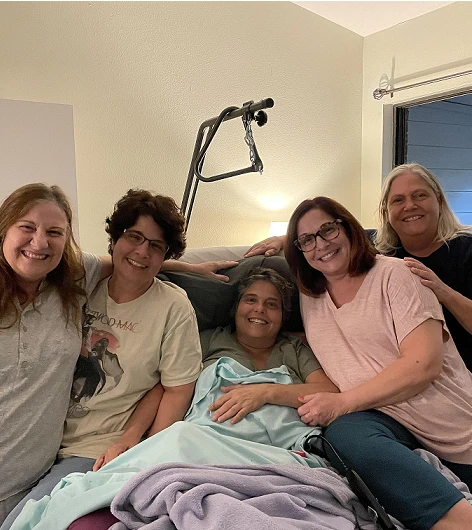
On May 30, 2021, Lia Day was in a horrific auto accident, and EVERYTHING changed both for Lia AND for her family. Prior to her accident, Lia was an active and independent 54-year-old. She worked as a dental assistant for over 30 years. It was more than a job; her colleagues and patients were part of her extended “family” and social life. She raised a son, Garrett, and was an involved member of her community. She loved hosting gatherings at her home, attending church, going out with friends, and helping babysit her friends’ children. Lia was never one to just “sit around.” Tragically, all of that life is now gone.
The accident left Lia quadriplegic, incontinent, and on a catheter. She needs assistance with every single aspect of daily life from bathing, eating, changing her clothes and incontinence supplies, and brushing her teeth. Even getting out of bed requires someone trained to operate a special lift.
Lia also needs someone trained to clean and empty her catheter. And, because she is in constant, extreme pain, the aides who help her dress, change, etc. must be skilled enough to ensure that their assistance does not further exacerbate her pain. Seventeen months after her accident, Lia’s pain is at its highest level, and she has had to be hospitalized for the pain associated with fluid-filled cysts that have formed along her spinal cord.
Although she worked her entire life, Lia’s only income is $1800/month from social security disability. Like most people she has no long-term care insurance. And, like most people who need long-term assistance with the basic activities of daily living, she relies on Florida’s Medicaid Long-Term Care (LTC) program.
After her discharge from the hospital, Lia had a choice of going to a Medicaid nursing home, or receiving home and community-based Services (HCBS) from a Medicaid managed care plan through what is referred to as the LTC Waiver. This program allows enrollees to receive health care and other services needed to stay at home instead of going to a nursing home facility. By opting to receive services at home, Lia is saving the state of Florida significant funding. The cost of providing skilled nursing home care is over 3 times the cost of providing HCBS.
Unfortunately, however, the managed care plan responsible for providing the services needed for Lia to stay safely at home has utterly failed to do so. Although Lia needs 24/7 care, her plan only covers 34 hours of personal care assistance. The plan has denied three requests for an additional 64 hours of personal care service. Her managed care plan has also failed to provide her with a nurse despite Lia’s use of a catheter and recurrent UTI’s. Instead, Lia’s friend, who is an RN, has had to change Lia’s catheter for the last year.
Lia’s family has reorganized their own full and busy lives in a Herculean effort to take care of Lia at home.
“I feel so awful for having to rely on my family and messing up their lives but at every turn I am denied the care I need from the system designed to help me,” says Lia.
Her adult son Garrett, who works full time, set up a room for her in his home. Her sister, Lisa, a registered nurse who also works full time, leaves her family four days a week to stay with Lia during the week and then works weekends to help support her family. Another sister, Linda, who lives in North Carolina with her husband, moved to Florida for 15 months to help take care of Lia. Even with such extensive family support, Lia has to depend on friends to help with her care when family members need to leave town because her Medicaid managed care plan has failed to provide necessary support services. “This has been life-changing for everybody,” said Linda.
Lia saw the stories of other Florida LTC waiver recipients having trouble getting needed care. She contacted FHJP because she wants everyone to know the problems people like her are experiencing trying to access the services they need from Florida’s Medicaid managed care plans. As Lia’s sister, Linda, said, “If you don’t have an advocate, you fall through the cracks.”

Florida Health Justice Project engages in comprehensive advocacy to expand health care access and promote health equity for vulnerable Floridians.
A copy of the official registration and financial information may be obtained from the division of consumer services by calling 1-800-HELP-FLA (435-7352) toll-free within the state. Registration does not imply endorsement, approval, or recommendation by the state.